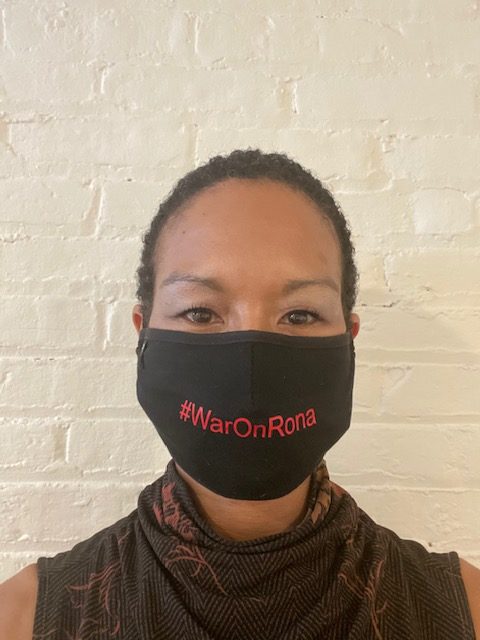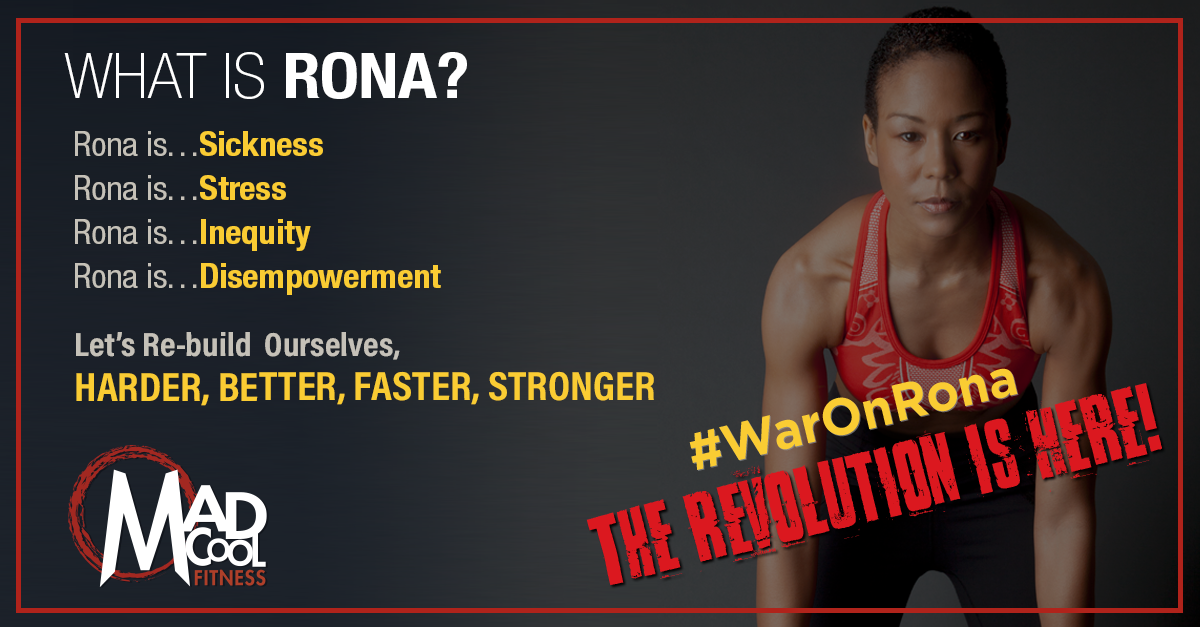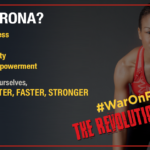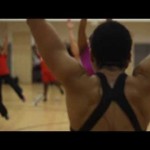Toward the end of what by all accounts was a disastrous year, I did a post reflecting on what we learned in 2020, and why, as we looked forward into 2021, it was THE time to wage #WarOnRona. I defined “Rona” as sickness, stress, inequity, disempowerment.
At the beginning of Black History Month this February 2021, which is also American Heart Month, I’m doubling down on that statement and following up with more evidence as to why this is in fact go time. It is critical that RIGHT NOW, we get our own health house in order, address some of the systems and policies that led to this virus running rampant, address the systems and policies that led to people of color being disproportionately negatively affected, while also taking personal responsibility for our own health.
The #WarOnRona is both an individual war and a systemic one.
From a social ecological perspective, our health status is a function of our individual factors (our health behaviors, beliefs, attitudes, culture) and our environment (social and physical), systems and policies that impact our health. These external factors are also known as the social determinants of health (SDOH). To get healthy, we must fight this war both at the individual and systemic levels.
An Individual War – The Voices in Our Heads
It’s the beginning of the New Year, and some of us are still buoyed by New Year, New You energy, but some of us may already be feeling that energy wane. A lot of things have already jumped off this year that could take the wind out of our New Year, New You energy sails – an insurrection, a monster surge, a monster snowstorm, the Rona remix with multiple strains popping up globally.
Usually in a “normal” year, around mid-February is when the bottom falls out of our resolve, and our resolutions get a little rickety. “Losing weight” and “getting healthy” are always at the top of the New Year’s resolution list, but as we get farther away from the stroke of midnight on December 31st…stuff happens. We get bored. We get busy. We get stressed. It rains. Somebody steps on our baby toe and we’re “injured”. (Man down, man down!) We eat something “bad”, which leads to us eating something else “bad”, and just like a snag in a pair of stockings from the 99 cent store, our food snag turns into a full blown run that no amount of nail polish can fix. We’re on a chicken wing and Dorito bender that no amount of kale consumption and a cleanse can fix. Ya’ll know what I’m talking about 😊.
But this year we cannot get thrown off the healthy course. 2021 is not a “normal” year. This year, with everything we’ve learned from 2020, we MUST get healthy. Not because we have a virtual high school reunion coming up and we want to look good and make our ex realize we were in fact “the one that got away”. No, this year, we have a higher purpose, a higher mission.
This year we must push past the feelings of demotivation, distractions, and stay focused on our mission: A mission of good health. Our lives literally depend on it! Here’s why.
The Coronavirus and Underlying Health Conditions
Over 450,000 people have tragically lost their lives in the U.S. since the pandemic began.
People with underlying health conditions are at increased risk of severe illness from this virus. Some of these underlying conditions include, but are not limited to: Heart conditions, obesity, diabetes, and smoking. The CDC also states people with asthma or who are overweight (BMI>25kg/m2 but <30kg/m2) might be at increased risk for severe illness. So eating well and moving, every day, consistently, are not just about vanity or something we “should” be doing. But at this critical moment, they are a “must”. Engaging in healthy behaviors is critical to us increasing our chances of withstanding and recovering from illness.
We are battling with ourselves to overcome our own internal dialogues about why we can’t exercise and eat healthy. We must overcome these thoughts, invest in our health because it pays huge dividends, and not just the kind our high school ex will notice!
Our individual war can start right now, TODAY. Bringing it back to our social ecological model, we must focus on the person factors in our health ecosystem we can control. Let’s step into our power. We must take personal responsibility, while also being aware of the systemic factors that impact our health, to ensure we are living as healthy as we can.
Part of personal responsibility is wearing a mask. We have the power to wear a mask. We must all keep ourselves healthy, and own our responsibility in protecting those around us from becoming sick with this deadly disease. So let’s mask up, eat a little more kale, eat a few less wangs, and move a little bit more. Let’s wage #WarOnRona and win. The time is now. We can do this!

This is what we are personally responsible for. But again, our health status is not separate from the environment and systems in which we live. Let’s talk about these systemic factors that are outside of our immediate control that affect our health. These factors will require seismic, integrated changes across multiple sectors that are steeped in the belief that all people deserve an equal opportunity to be healthy.
A Systemic War – The Social Determinants of Health
The Social Determinants of Health (SDOH) are the environments and systems that impact our health. These categories include: Economic stability, education access and quality, healthcare access and quality, our physical, built environment, our social environment and community context.
Examples of these determinants include safe housing, access to healthy foods, education, job opportunities, and opportunities for economic advancement. Discrimination, which includes racism, negatively impacts these determinants, and works counter to creating a healthful society. Racism leads to health disparities and affects the social determinants of health. Racism affects a person’s community – causes poverty, violence, poor housing, food deserts. Access to quality healthcare, education, income and wealth generation opportunities are diminished.
If you don’t have access to healthy food, or can’t afford healthy food, you will not eat healthy food. Simply promoting healthy eating without providing the access (physical and economic) will not lead to people actually eating healthy, beyond overcoming some of the personal factors we previously discussed. The conditions in which people live must improve.
Not having access to grocery stores with healthy foods, means you will eat less healthy. This will increase the risk of disease like obesity, heart disease, diabetes, hypertension, leading to lower life expectancy, even without contracting the coronavirus. If you don’t have health insurance, you may not seek care. You will not go outside for physical activity if you think you might get shot. If you don’t have access to transportation, this may negatively affect your job prospects. If you don’t have access to transportation, this may negatively affect your job and income opportunities. Lack of transportation may also limit your access to healthcare.
The Social Determinants of Health and the Coronavirus
- Race and Coronavirus Morbidity and Mortality – Black and brown people are being hospitalized and dying at higher rates than whites. According to the CDC: Hispanic and Latinos have hospitalizations 4.1 times that of whites and a mortality rate 2.8 times that of whites; Blacks have hospitalizations 3.7 times that of whites and a mortality rate 2.8 times that of whites; Native Americans have hospitalizations 4 times that of whites and a mortality rate 2.6 times that of whites.
- Occupation Impacts Health – In a recent study, excess mortality from the coronavirus was found in essential workers across white, Black, Latino and Asian Californians across multiple non-healthcare sectors (food/agriculture, facilities, manufacturing) (Chen et al., 2021). Beyond healthcare workers who are clearly at greater risk of exposure, people working in these sectors also have increased chances of being exposed to the coronavirus. Possible increased risk factors include being in contact with the public, not being able to get paid sick days, not being able to work from home. Occupation is function of education and opportunity.
- Housing – Some people from racial and ethnic minority groups live in crowded housing, with multi-generational families, and sometimes, multiple families cohabitating. These conditions make social distancing really challenging. Job loss from this pandemic may also lead to eviction, homelessness or the need for people or families to move in with each other.
- Vaccine Distribution Disparities - We are still in the early stages of the vaccine roll out, but already there are clear racial disparities observed about who is getting the vaccine. According to the CDC among the race/ethnicity data reported, 60.4% of those vaccinated were white; 11.5% of those vaccinated were Hispanic/Latino; 5.4% of those vaccinated were Black; and 2% of those vaccinated were Native American/Alaska Native.
So what does all of this mean?
NOW is the Time
We must acknowledge racism, social injustice, and address the social determinants of health in a comprehensive manner from multiple sectors – academia, corporate, government, non-profit, community-based organizations – and use the scourge of the coronavirus as a rallying cry to re-build a healthcare system, and a society, that is better and more equitable.
We must ensure that health is a social good, not a market good, and that everyone has equal access to care. Our politicians, lawmakers, and corporations, hand-in-hand with community stakeholders, must lead the charge in changing the systems, policies, and structures to have a fair and equitable ecosystem of health.
On an individual level, we must challenge those personal factors I previously highlighted that are standing in the way of us taking control of our health and ultimately our lives. This means making our best possible efforts to eat well and move every day.
We must get healthy RIGHT NOW! We must make our health our #1 priority. We must invest in our health so that the probability of us withstanding illness and recovering is higher.
We must wear a mask. Period.
The time is now. Let’s work on ourselves. Let’s work on our systems of health. Let’s wrestle Rona to the ground and re-build ourselves harder, better, faster, stronger and re-build our healthcare systems to reflect what this country is supposed to stand for – with liberty and justice and (access to good health) for all.
So rise up, mask up, get up and move, and #StepAwayFromThatChickenWing! Within our individual sectors of government, corporate, academia let’s work within our domains, and also across them to effectuate change.
Let’s win the #WarOnRona and realize a better, equitable, healthier future.
Dr. Jennifer Turner
Founder, MAD COOL FITNESS/MAD COOL COMMUNITY
Featured Fit Tips Jennifer's Posts







